Digital
desks are gaining in popularity and
it is your choice, after all, whether
you want the learning curve?.
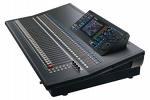 I am not impressed by
the Yamaha LS9 mixing desk [my
opinion?]
I am not impressed by
the Yamaha LS9 mixing desk [my
opinion?]
 Plug-in
effects or stand alone rack mounted in your
home studio?
Plug-in
effects or stand alone rack mounted in your
home studio?
My
experience as below still tells me the
same story.
Whilst
the Protools onboard effects are Okay
I only use the Long Delay programme
[you hear it on nearly every hit track
today]
I prefer outboard effects
I have approx 13 from memory in my home
studio
. My favourites are USA built
because you certainly hear them working
ART
Digitech
Multiverb
then
Lexicon [the Industry standard for reverb]
Roland for its Roland RSS effects:
throws the repeats and choruses right
out past the left/right speakers
I
also have a few Zoom 1201 and 1204
very clean and very reasonably priced.
I go by the sound not by the price.
Being a brand snob gives branditis
- a debilitating disease among music
guys that is hard to get rid of [grin!]
I must have been immunised against this
at an early age? Ears tell you the quality
not price
or brand name.
The on-board effects on the Triton and
Motif can by very nice.
 Self
powered plug-ins in your home studio?
Self
powered plug-ins in your home studio?
There is a type of self powered plug-in system
which has its own CPU and thus operates
independently of the computer. UAD are
probably the best for these
I have looked at
them and am personally not convinced that
there is a benefit in using them.
http://www.uaudio.com
The
UAD series are reasonably priced but I have
seen others with huge price tags ... I prefer to
have the real thing!
 The UAD plug-in hardware - with
it's own CPU - plugs into the Tower.
The UAD plug-in hardware - with
it's own CPU - plugs into the Tower.
 Compressors
in your home studio?
Compressors
in your home studio?
Compressors
are the unsung heroes of hit recording
not understood by amateurs and novices
but the successful guys know compressors
inside out
. My essential compressor
for lead vocals is still the TLA Audio
Fatman 11
stereo valve compressor
used by all the top Hip Hop guys
.
 The incredible
Fatman
The incredible
Fatman
You
certainly hear it working
Again, I am not impressed by the compressor
plug-ins although I have used Bomb Factory
in the Protools set up
. Yes, you can hear it
working but I much prefer the outboard sound.
 A
dedicated drum sound module in your home
studio?
A
dedicated drum sound module in your home
studio?
I
would consider a stand alone drum module
very quick, easy and handy to use
I use the Alesis DM5 as my main drum
sound module
but am also using the
on board ProTools stuff. The latest
DM10 is a wonder ... check it out here:
Alesis
DM10 Demo
I
always use drum samples, as well, to
layer the sounds and get a perfect for
the track, new, drum sound
then
I sample that and keep it safe for re-use.
Thus, my drum sounds are evolving with
each project.
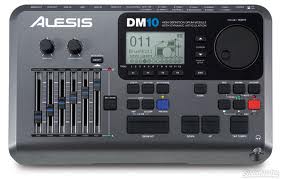
Alesis DM10 drum sound module
 What
monitors in your home studio?
What
monitors in your home studio?
Monitors
are the most important part of a studio
set-up. All the great equipment is no
good unless you hear it properly
After sound proofing and insulating
your home studio ensure that it is as
dead sounding as possible
see http://www.makehits.co.uk/art019.htm
for this advice.
Still the only monitors to use in your
home studio are the ancient Yamaha NS10S
. Industry standard throughout the
world, easily identified by their cute
white cones and essential for mixing
hit records
despite what the amateurs
and novices say
and that is why you
see them in every major studio
it
is a constant, accurate, reference point
right through the world. Hard to find
but worth the search.
I recommend the Studiosound look-alikes
SN10 to all Members of the Serious
Writers Guild and have never had
a complaint .. at £97? A silly price.
 Studiospares SN10
Studiospares SN10 |
 Yamaha NS10 - spot the difference?
Yamaha NS10 - spot the difference? |
Main massive studio speakers are simply
personal choice ... you may be experienced
and know the sound you want ... or you
may be influenced by others or by reviews
... always remember that every speaker
will sound totally different in every
different acoustic environment.
Of course, it is essential to drive
them with the biggest power amp you
can afford [with no cooling fan]
I
use an ancient Quad 303 for the NS10S
now can you find one of them? I also
use a 1,000 watt Yamaha [with no fan
keeps the inherent noise down]
Some
monitors are self powered ... making for a very
efficient system.
 What
microphones in your home studio?
What
microphones in your home studio?
Microphones are the easiest to choose
you
need one good condenser mic. for vocals
.
Neumann are Industry Standard but have a
prohibitive price tag. I
use the Shure KSM27 mostly
a superb all
round microphone that has featured on many of
my huge selling tracks
the Shure SM58 is
industry standard for vocals
and the SM57
for instrument and drum miking.
USB
mics are beginning to make an impression
... used straight into your computing
recording with USB ... I use a Monacor
DM-500USB for talking stuff ... quite
tasty.
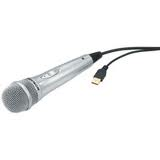 monacor DM-500USB
monacor DM-500USB
|

Shure
KSM27 |
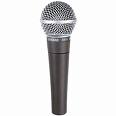
Shure
SM58 |

Shure
SM57 with the only
guitar equipment to use |
 What
earphones in your home studio?
What
earphones in your home studio?
The last requirement for a good home studio,
to ensure a professional standard, is earphones.
Essential, when recording, as you will most likely not
have a live recording space separate to the control
room.
Still the Industry standard, just like
NS10S, is Beyer Dynamic DT100
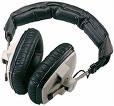 used in every major studio in the world
and in TV and Radio. They are modular
built so any part can be replaced if
broken or damaged. Very high SPL and
comfortable to use
with padding to
isolate the sound from microphones etc.
when tracking [playing or singing with
a track to record].
used in every major studio in the world
and in TV and Radio. They are modular
built so any part can be replaced if
broken or damaged. Very high SPL and
comfortable to use
with padding to
isolate the sound from microphones etc.
when tracking [playing or singing with
a track to record].
I use these for recording
through
a Behringer Powerplay Pro which can
deliver sound for up to 8 sets of earphones.
Again, a product which Behringer have
got right.
For general Midi music writing to computer
and overall listening [after my self
imposed 10pm cut-off] I use Sennheiser
lightweight earphones
excellent quality
but slightly lacking in SPL
this is
a benefit as it makes me keep the level
down from blood dripping from the ears
which can cause long term ear damage.
The softness of the earpieces is excellent
for lengthy sessions.
Sennheiser HD400 and HD414
classic
earphones with soft, soft foam
http://www.sennheiser.co.uk
Beyer Dynamic DT150 have an extended
bass frequency range
but I have never
found that necessary for studio work.
 PreAmps?
PreAmps?
You
will notice I still do not dwell on
Pre-Amps
mainly because I have never
found the necessity to use them
I
consider the pre-amps on the Digidesign
003 to be fine
for the type of commercial
money making productions I do.
 So what else do I need to get
started in your home studio?
So what else do I need to get
started in your home studio?
A good pop shield in front
of the microphone - many are available
and quite cheap. Check out
www.Studiospares.com
The
incredible Red 100 from StudioSpares
in the UK is a sensational microphone
reflection filter that sits behind the
microphone and stops any unwanted echoes
and reflections from entering the back
of the microphone. Stunning.
 Red 100 reflection filter
Red 100 reflection filter
 And finally in your
home studio?
And finally in your
home studio?
The CD recorder?
Which make? I have never
been convinced that one is better than the other ...
I still use my very first recorder .. a Phillips ...
must be twelve years old. And then, I bought
it second hand as they were horrendously expensive
when they first came on the market ... and no one
really knew whether the format would become Industry
Standard.
Just a word of warning ...
never believe the argument that MP3, or, worse
still, Mini Disc, is as good as 41.4Hz CD ... it
simply is not!
So .....
Best of
luck with your next project ... with the gear
above there is no excuse ... oh, except that you
have to know what a hit record is and how to
write it and produce it .... where do you learn
that?
The Serious Writers Guild ... membership
simply by purchasing "How
To Make A $Million From Your Music"
By the
way, never master your own material ... bring it
to the best Mastering Suite you can afford.
a home studio can produce stunning top quality
results but the Mastering Suite is where the
'fairy dust' is liberally sprinkled.
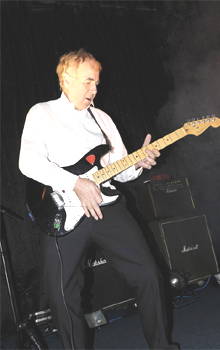 Regards from Dec
Regards from Dec
| The
idea for this article on home studios was from songwriting
and music making members
of The Serious Writers Guild. It
gives an idea of the benefits of
belonging to the Guild. You can
join simply by purchasing the ten month
programme 'How to Make A $Million From
Your Music' at www.makehits.co.uk/swgappsecure.htm |
Get
Dec to look at your recording skills,
writing skills..... show you the quickest
way to stardom.

A full
day's Consultation with Dec ... he will
show you what you are doing right and
what you are doing wrong ... this is
a total short cut to fame and fortune.